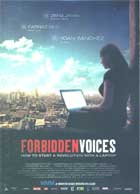
Forbidden Voices: How To Start A Revolution With A Laptop 2012
Distributed by Women Make Movies, 115 W. 29th Street, Suite 1200,New York, NY, 10001; 212-925-0606
Produced by Philip Delaquis
Directed by Barbara Miller
DVD , color, 96 min.
General Adult
Human Rights, Totalitarianism
Date Entered: 05/21/2014
Reviewed by Sandra Collins, Byzantine Catholic Seminary Library, Pittsburgh, PAThis film offers a first-hand perspective on what it’s like to be a cyber-revolutionary blogger under a totalitarian regime in the 21st century. No other voice or narration is offered save those of the three women: Yoani Sánchez (Cuba), Zeng Jinyan (China) and Farnaz Seifi (Iran). Each in their own way expresses their drive to confront oppressive regimes as well as exemplify the toll it has taken on their personal lives. Sánchez, perhaps the best known of the three, is beaten for criticizing her country and is basically a prisoner of Cuba since the government has denied her any sort of travel visa. Because of her outspokenness, Zeng is followed and eventually saddled with house arrest while her activist husband is imprisoned for more than three years. Seifi, a journalist as well as blogger, lives in exile outside of Iran and, for the safety of her family still there, blogs under a pseudonym. All depend upon international help, especially from groups like Reporters Without Borders, and Western celebrity involvement from individuals like Andy Garcia.
While identified at one point in the film as ‘cyber-feminists,’ their focus in this film does not seem to be gender-specific. Rather, they work for the human rights of their fellow citizenry, seemingly without reference to gender. For example, Sánchez labors on behalf of fellow dissident, Guillermo Fariñas, eventually encouraging him to end his 134 day hunger strike after the Cuban government released 52 political prisoners.
This film requires some familiarity with political moments like the Arab Spring, Iran’s 1979 Revolution and Tiananmen Square as these are cited as pivotal moments in the consciousness of these women. But the soul of the message here is that the power of the one can spur the hearts of the many when it comes to political oppression and basic human rights. Recommended for collections where resources on international human rights, totalitarianism or grass-roots political movements are essential.
-
Awards
- Amnesty International Award, San Sebastian Human Rights Film Festival